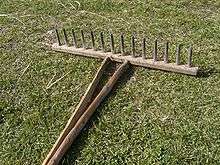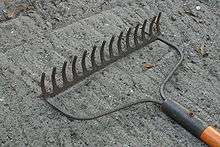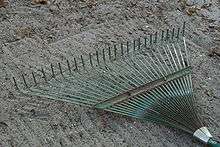Rake (tool)



A rake (Old English raca, cognate with Dutch raak, German Rechen, from the root meaning "to scrape together," "heap up") is a broom for outside use; a horticultural implement consisting of a toothed bar fixed transversely to a handle, and used to collect leaves, hay, grass, etc., and, in gardening, for loosening the soil, light weeding and levelling, removing dead grass from lawns, and generally for purposes performed in agriculture by the harrow.
Large "mechanized" versions of rakes are used in farming, called hay rakes, are built in many different forms (e.g. star-wheel rakes, rotary rakes etc.). Non-mechanized farming may be done with various forms of a hand rake.
Types of rakes
Modern hand-rakes usually have steel, plastic, or bamboo teeth or tines, though historically they have been made with wood or iron. The handle is often made of wood or metal. Some rakes are two-sided and made with dull blades in the shapes of slight crescents, used for removing dead grass (thatch) from lawns. When rakes have longer teeth, they may be arranged in the shape of an old-style folding fan.
Cultural associations
If the rake lies in the ground teeth up, as shown on the top picture, and someone accidentally steps on the teeth, the rake's handle can swing rapidly upwards, colliding with the victim's face. This is often seen in slapstick comedy and cartoons, such as Tom and Jerry and The Simpsons episode "Cape Feare", wherein a series of rakes become what Sideshow Bob describes as his "arch-nemesis". There is a Russian saying "to trip twice on the same rake" (наступить дважды на одни и те же грабли), which means "to repeat the same silly mistake".
Heavy rake
For conditioning and de-thatching soil as well as moving larger pieces of debris. Most weeds have weaker and shallower roots than grass and thus de-thatching along with (afterward) necessary sunlight, fertilizer and seed, and if later necessary any remedial chemicals, makes for a good crop of grass. Larger tools (or lawnmower attachments) are more often used for large areas of de-thatching or soil preparation. However the action of making the soil bare and exposed to sun is not good and worms do not like it. It should be protected with straw afterward. Soil aeration tools do not remove weed but prepare soil without exposure.
Plastic or metal
There are pros and cons to each. Plastic rakes are typically cheaper and lighter in weight but break easier and bend under weight and/or pressure. Metal rakes are better for moving larger piles of leaves and they can withstand a little more abuse but cost more to purchase initially. When it comes to raking leaves, either rake will work and user preference is often the deciding factor.
See also
References
 This article incorporates text from a publication now in the public domain: Chisholm, Hugh, ed. (1911). "article name needed". Encyclopædia Britannica (11th ed.). Cambridge University Press.
This article incorporates text from a publication now in the public domain: Chisholm, Hugh, ed. (1911). "article name needed". Encyclopædia Britannica (11th ed.). Cambridge University Press.
External links
![]() Media related to Hand rakes at Wikimedia Commons
Media related to Hand rakes at Wikimedia Commons